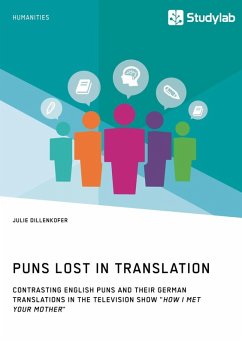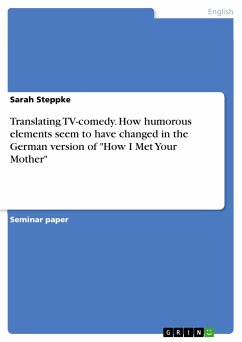Translating a text into another language is a process mostly known in the area of literature. At the same time (even though often disregarded in this connection), translation is a central part of filmmaking. Since the emergence of sound films in the 1930s, screen translation (that is, subtitling, dubbing and voice-over) has become a tradition in Europe. In Germany, dubbing has been the universalized means of defying language barriers in the field of movie and television ever since. However, it is commonly believed that translated movies and television series lack certain features as compared to their original. Disapproval of dubbed movies and television shows has become quite frequent in Germany, not necessarily among linguists and/or multilingual people exclusively. In the case of dubbed sitcoms which originate in the United States, it is safe to say that the German audience repeatedly stumbles upon scenes that are entirely incomprehensible and, even more perplexing, end in the laugh track which is typically inserted in US situation comedies. Clearly, the source text contains a joke that has been lost in translation. But what are the reasons for such ineffective adaptations? Is it the fact that the original jokes include a culturespecific term that is only understandable in the source language or is simply the translators' carelessness to blame? Research in media, humor and translation studies reveals that wordplays2 are a universal phenomenon which is generally considered untranslatable. In this paper, I argue that the German dubbed versions of US American sitcoms lose a great deal of their humor since language jokes, particularly puns, are rarely successfully translated. The dubbed versions include a remarkably large number of literal translations and even direct copies of English words which not only are no longer funny, but are also incomprehensible in the target language. Unfortunately, it seems to be the case that no research on English puns and their German dubbed translations has been conducted to date. Therefore, I will examine how English puns are adapted in the corresponding German translations. For this study, I will analyze the popular US television series How I Met Your Mother, which ran in the United States from 2005 to 2014 and is well-known for its jokes and frequent use of puns.
Dieser Download kann aus rechtlichen Gründen nur mit Rechnungsadresse in A, B, BG, CY, CZ, D, DK, EW, E, FIN, F, GR, HR, H, IRL, I, LT, L, LR, M, NL, PL, P, R, S, SLO, SK ausgeliefert werden.









